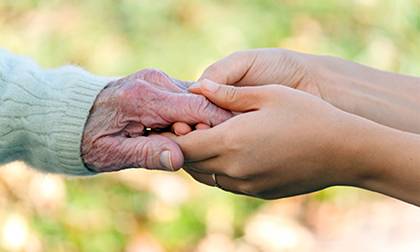Tips for Caring for Aging Parents, Sick Loved Ones
Duke offers support groups and resources to faculty and staff caregivers

Four months have passed since David Pittman moved his parents to Durham and into their shared Durham home, where he cares for his mother with multiple sclerosis and his father with dementia and Parkinson’s disease.Pittman, who is the director of Student Life at Duke, organizes medical appointments at the Durham VA Medical Center and Duke Hospital. He cooks meals, freezes leftovers and shops for groceries. He takes his parents to The Streets at Southpoint to shop and people watch on a weekday night. All the while, Pittman was finishing a Ph.D. and working full-time. “Early on, it was ‘do all, be all,’” Pittman, 45. “I was so exhausted that I really had to prioritize what my social outlets were. It’s hard to take care of yourself while you’re taking care of someone else.”November is National Family Caregivers Month, when healthcare and social workers, workplaces, and families take time to recognize the daily needs and challenges caregivers face. According to the Caregiver Action Network, a national caregiver support organization, 39 percent of all adult Americans are caring for a loved one who is sick, disabled, or living with frailties of old age. These caregivers can be caring for a sick spouse to a child with special needs to an aging parent. Across Duke, caregiver support groups and programs offer resources for those caring for aging parents or sick relatives. Here is a list of different caregiver programs and advice:Create a caregiving teamThe Duke Family Support Program, which is located in Duke South, provides elder care consultations, referrals and resources at no cost to Duke faculty, staff and their family members seeking help for all types of elder care decisions. Bobbi Matchar, a social worker with the program, recommends creating a strong team of individuals who can help with caregiving. A common consultation topic is family conflict, when family members disagree over caregiving plans. “It’s very common for one person in the family to become ‘it’ and take the lion’s share of responsibility,” Matchar said. “Oftentimes in families, there’s a lack of balance with responsibility. I tell caregivers to not expect it to be equal.”

For Pittman, a strong support network helps him maintain work-life balance while caring for his parents.“I work with people who are having the same experience that I am,” he said. “We can just kind of look at each other sometimes and know that it’s been a rough day or a rough night. The minute you open yourself up about it, you will find out who the others are and you can reach out for support.”To learn more about elder care consultations and available support groups, visit the Duke Family Support Program website or call (919) 660-7510.Short-term counseling for family concernsDuke employee caregivers can visit Duke’s Personal Assistance Service, known as PAS, which provides voluntary, short-term, confidential counseling. Employees and their eligible family members can receive up to eight short-term counseling sessions per concern at no charge. Visit the PAS website for more information. Caregiver support at Duke MedicineDuke Cancer Institute’s Mind-Body Support Group, which meets on the first and third Thursday of the month at 3 p.m., welcomes caregivers and their family members with cancer. Other Duke Medicine groups exist for caregivers taking care of patients with an adult bone marrow transplant to Alzheimer’s. Visit the Duke Medicine events calendar.A caregiver can ask the patient’s health providers directly if they know of any local support groups or caregiver resources.Discuss long-term family plans earlyWhen Courtney Van Houtven traveled home to Oregon for Thanksgiving last year, she made talking with her parents about their long-term care a priority. Van Houtven, a Duke associate professor of medicine and a Durham VA health economist, studies the effects of caregiving on parents and children. She recommends talking with parents early about their long-term plans before any medical issues arise.“You don’t want to make a plan when you’re responding to a crisis,” she said. “Make a plan with the parent when they’re in generally good health.”